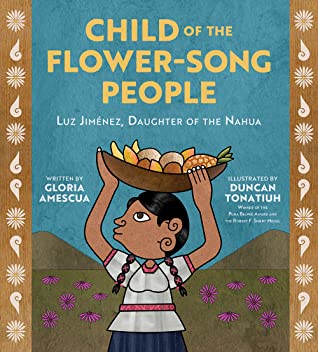 As a reader and educator who is drawn to the artistry of Duncan Tonatiuh as well as stories of indigenous people, I immediately welcomed Child of the Flower-Song People: Luz Jiménez, Daughter of the Nahua into my library. Both the author and subject were new to me, and after many close readings I am still finding multiple reasons to appreciate the poetic text and research of Gloria Amescua, the uniquely created illustrations of Tonatiuh, and the biography of a woman, Luz Jiménez, whose life is both a historical monument and an example of being true to one’s cultural identity.
As a reader and educator who is drawn to the artistry of Duncan Tonatiuh as well as stories of indigenous people, I immediately welcomed Child of the Flower-Song People: Luz Jiménez, Daughter of the Nahua into my library. Both the author and subject were new to me, and after many close readings I am still finding multiple reasons to appreciate the poetic text and research of Gloria Amescua, the uniquely created illustrations of Tonatiuh, and the biography of a woman, Luz Jiménez, whose life is both a historical monument and an example of being true to one’s cultural identity.
Beginning with the simplistic life of Luz in Milpa Alta, Mexico, the power of cultural stories is shared through the author’s weaving of traditional stories of the Nahua into a description of Luz’s youth. Readers learn of the history of Nahua people, descendants of the Aztecs, as they struggled to maintain their lifestyle, culture, and language, especially after the Mexican Revolution that destroyed Milpa Alta and left women and children fleeing to Mexico City. The education of Luz at a time when indigenous children were schooled to teach them the Spanish ways revealed both her successes in mastering curriculum but also success in secretly sharing stories in her language with other Nahua children. The significance of the arts, especially in preserving history and culture is shown as the narrative describes Luz being selected to model for paintings and sculptures. Her strong features are found in the work of artists of the time, such as Fernando Leal, Diego Rivera, and others. Significant is her role in working with linguists to preserve her language and culture in print. She desired to teach and found teaching opportunity in both guiding scholars and artists through Milpa Alta and teaching about the region’s culture. Teaching also became a reality through the opportunity to teach language at a university. She was an amazing Mexican woman whose cultural identity has been shared through the arts and written text.
Adding to this story is the artistry of Tonatiuh whose style is readily recognized as inspired by pre-Columbian art. Within this book he states he is also inspired by the art of those for whom Luz modeled. The dust jacket of the book reflects the work of Fernando Leal, as mentioned in the Artist’s Note, and while it is a worthy image to be displayed on its own, readers can remove the dust jacket to find cover images that are part of the interior illustrations: A profile image of Luz on which is printed text in Nahuatl and on the back cover, Luz pictured telling anthropologist Fernando Horcasitas her stories. Additionally, the end pages provide a floral wallpaper effect indicative of the “flower-song”, a term that the author describes as representing the Nahua spirit of poetry being “the flower and the song.”
Both an author’s note and illustrator’s note provide further information about Luz as well as the creation of this book. A timeline of Luz’s life, a glossary for Aztec words used within the text, and a select bibliography provide for further insight into this notable woman.
This book offers many points of discussion around history, critical social issues, the role of arts in culture, and the significance of story in our lives. Most important, it is a lovely and inspiring creation – a tribute in words and images to an individual from whom children can learn and admire. Recommended by– Janelle Mathis, University of North Texas.
Title: Child of the Flower-Song People: Luz Jiménez, Daughter of the Nahua
Author: Gloria Amescua
Illustrator: Duncan Tonatiuh
ISBN: 9781419740206
Publisher: Abrams
PubDate: August 17, 2021
Each month a committee of Worlds of Words advisors recommends a book published within the last year. Our hope is to spark conversations on our website and on social media about the book that expand global understandings and perceptions. Please join us by leaving a comment. You can also share your thoughts with us by using the hashtag #WOWRecommends on social media.
- Themes: Child of the Flower-Song People, Duncan Tonatiuh, Gloria Amescua, Janelle Mathis
- Descriptors: WOW Recommends
